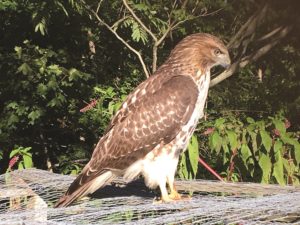Every backyard chicken farmer must face the fact that some animals around us see those friendly hens as prey. On the Outer Cape, our flocks are up against a long list of predators: raccoons, owls, fishers, Cooper’s and red-tailed hawks, eagles, ospreys, foxes, coyotes, skunks, weasels, bobcats, opossums, and snakes all are thrilled to discover a coop. And what’s worse: once these meat-lovers have found your poultry buffet, they will return again and again if not deterred.
Keeping your flock safe in winter can be especially challenging. The cold weather drives wild prey into hiding, making the inhabitants of your chicken yard relatively easy pickings. And their wild predators are less cautious and more likely to risk coming close to your home when they are winter hungry.

Losing one or, depending on the type of predators involved, a number of your flock is traumatic. But it happens. Predator-proofing your coop is a must. Ready-to-assemble coop kits bought online might be fine in a suburban setting but will not stand up to the wildlife here.
Outermost chickens need protection from above, below, and all sides, so your coop should be raised with a solid floor, surrounded by heavy-duty chicken wire — some people even go heavier and tighter, using so-called hardware cloth — on all sides, and have doors with secure latches.
My husband proudly refers to our coop as a “chicken fortress.” Still, we have learned the hard way that predators are smart, sneaky, and will take advantage of every opportune moment or vulnerability.
None of us can forget the first time we found a lifeless bird on our homestead. We were just eight months into our backyard chicken adventure, and the novelty of keeping a flock meant that we were especially doting. On a sunny winter day one of our ladies, Madeleine, had cozied up to the chicken wire in the brightest corner of our coop when a red-tail hawk swooped down and, reaching right through the wire, pecked her head. We found poor Maddy dead and her sisters in a terrified huddle. There was blood. I considered giving up on keeping chickens that very afternoon.
There are ways, beyond a sturdy coop and covered run, to keep your chickens as safe as possible. Knowing your enemies and their attack styles is a must.
Foxes are famously fearsome chicken killers. They are smart. They will stake out your home and get to know your schedule, hunting mostly under cover of night. Foxes attack swiftly. When they see an opening, they’ll scoop up a single bird and carry her off, leaving no mess. All this is true of coyotes, too.

Hawks, the most common predators here, will perch on nearby trees or fence posts to scan for prey, then swoop down and tear into a victim, sending a flurry of feathers into the air. They hunt mostly by day.
Raccoons and weasels are the most sadistic predators. Night or day, if either gets into your coop, be prepared to find your flock treated like candies in a sampler, decapitated and cast aside.
Make sure you are closing all doors at night. Check your coop regularly for tears in the wire or loose latches. Hang shiny items — old CDs work well — to deter birds of prey. The right breed of dog (not one bred to hunt birds), well-trained, can become a good guard. So can a rooster, which I can recommend only if your neighbors are at a good distance, and you are an early riser. A cock will risk his life to defend his ladies and is a proven fighter against most any opponent.
If you occasionally free range your hens — a high-risk scenario but one that provides an enormous quality-of-life boost to your birds — provide strategically placed shelters, where they can take cover from aerial assaults. A garden bench or even a bucket, cut in half and placed on the ground, will do the trick.
For all you do to protect your flock, if you fail and find a bird mauled but still alive, trying to get it to a vet, or nurse it at home, is almost always a lost cause. A swift ax to the neck is usually the most merciful end to its tragic tale.
The worst does happen, even to the best of us. Predators are undeniably good at what they do. Victoria Pecoraro has been keeping chickens on her Wellfleet Chick Koop & Farm since 1999, and, when it comes to predators, she is philosophical: “I have huge respect for them, despite the carnage.”



